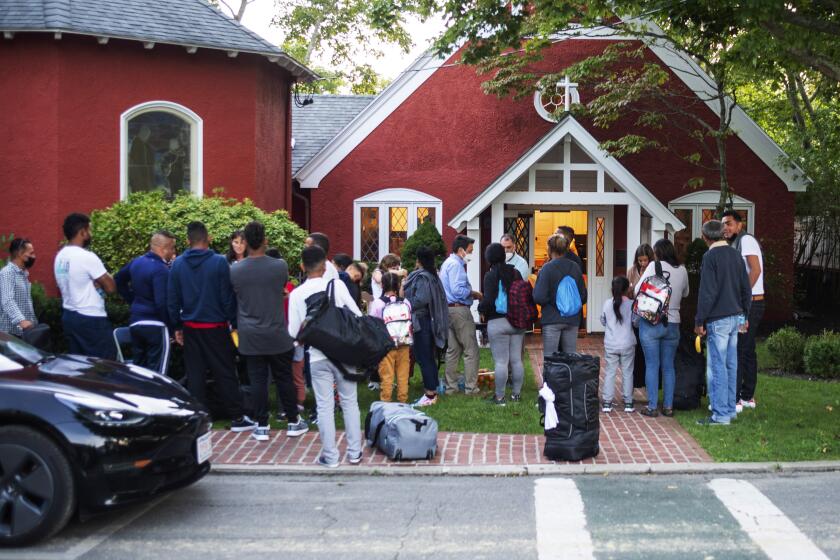Newsom signs bill allowing California IDs for immigrants in the country illegally

California Gov. Gavin Newsom has signed into law Assembly Bill 1766, which expands eligibility for state identification cards.
- Share via
Throughout her life in California, Kassandra Merlos has relied on her Mexican passport as her sole form of identification.
When she has rented apartments, she has been reluctant to mention that she’s in the country without legal status and only has her passport for identification. When she has gone out to bars with friends, she has felt discriminated against when told she needs a California license or an ID to get in.
For nearly a decade, immigrants who are in the country illegally have been able to get a restricted California driver’s license, but Merlos doesn’t drive. The 26-year-old applied for the Deferred Action for Childhood Arrivals program — better known as DACA — to get a work permit, but the program is no longer processing new applications.
Her mother and brother, who has epilepsy, also don’t have driver’s licenses. None of them have state-issued identification.
That’s expected to change now that Gov. Gavin Newsom has signed into law Assembly Bill 1766, also known as “California IDs for All.” Under the bill signed last week, California ID eligibility will be expanded for close to 2 million people who lack legal status.
The law will go into effect no later than July 1, 2027.
“I feel honestly like it’s a huge relief,” said Merlos, an Oakland resident. “If I get stopped, now I have something to identify myself with — not just my Mexican passport. It’s just something that identifies you in this country.”
In a statement Friday, Newsom touted the bill, along with other legislation that would allow street vendors to more easily obtain local health permits and provide immigrant students with improved access to in-state tuition at public colleges and universities and to ESL courses at community colleges.
In addition, he signed a bill that will provide low-income Californians, regardless of their immigration status, eligibility for legal assistance in civil matters affecting basic human needs.
“California is expanding opportunity for everyone, regardless of immigration status,” Newsom said in a written statement. “We’re a state of refuge — a majority-minority state, where 27% of us are immigrants.”
Newsom said signing the bills would “further support our immigrant community, which makes our state stronger every single day.”
The governor’s stance is in sharp contrast to what has unfolded in places such as Florida and Texas. Republican governors there have taken to transporting recently arrived immigrants to liberal cities and states, in what critics have called a political stunt at the expense of vulnerable people.
A lawsuit alleges Ron DeSantis’ agents lied to get migrants to board flights out of Texas.
“We are not a sanctuary state and it’s better to be able to go to a sanctuary jurisdiction and yes, we will help facilitate that transport for you to be able to go to greener pastures,” Florida Gov. Ron DeSantis said earlier this month.
“The Biden-Harris Administration continues ignoring and denying the historic crisis at our southern border, which has endangered and overwhelmed Texas communities for almost two years,” Texas Gov. Greg Abbott said in a news release, explaining his justification for sending immigrants out of the state to “sanctuary cities.”
Immigrants have arrived in New York City; Chicago; Martha’s Vineyard, Mass.; and, at one point, at the doorstep of Vice President Kamala Harris’ Washington, D.C., home.
Republican Gov. Greg Abbott of Texas bused about 100 people to Vice President Kamala Harris’ doorstep Thursday morning.
“This is one of those times that I’m really proud that Gov. Gavin Newsom is my governor,” said state Assemblymember Reggie Jones-Sawyer (D-Los Angeles), who co-authored AB 1766. “Governors all across the country right now are doing things to immigrants that are not human, transporting them to other places and really using them as pawns. This governor is taking a really crucial step to support California’s undocumented population.”
California has long set itself apart in its support of immigrants who are in the country illegally.
In 2013, then-Gov. Jerry Brown signed Assembly Bill 60 into law, which requires the Department of Motor Vehicles to issue driver’s licenses if applicants can prove their identity and California residency, as well as meet all testing requirements, regardless of whether they can show they are in the country lawfully.
The front of the licenses includes the phrase “Federal limits apply,” and the back states: “This card is not acceptable for official federal purposes. This license is issued only as a license to drive a motor vehicle. It does not establish eligibility for employment, voter registration or public benefits.”
The law passed after more than a decade of fierce debate. Critics at the time blasted California for giving out the licenses, saying they legitimize illegal immigration and make it easier for immigrants who are in the country illegally to remain here.
Since the law took effect in 2015, the DMV has issued a little more than 1.1 million AB 60 driver’s licenses, according to the department.
But AB 60 “left out those who couldn’t drive, or lacked access to a car, or a car that could pass inspection or who had a health condition that prevented them from driving,” said Ariel Brown, a staff attorney at the Immigrant Legal Resource Center, which co-sponsored the bill.
“AB 1766 will close this gap and enable people, even people who don’t drive, to get a government-issued ID, which is really, really important,” Brown said.
Alberto Gomez Fernandez, a street vendor who fashions unicorns, airplanes and other figurines from balloons, doesn’t have a driver’s license. He doesn’t feel comfortable behind the wheel and doesn’t really need a car for his job.
But the 55-year-old from Guerrero, Mexico, said he has grown tired of having to depend on his Mexican consular ID.
He has lived in California for more than 15 years, but nearly always has to provide extra paperwork to prove his California residency.
“The consular card isn’t enough,” Gomez Fernandez said. “It makes it harder to rent an apartment or even buy a cellular phone.”
Assemblymembers Mark Stone (D-Monterey Bay), Jones-Sawyer, Robert Rivas (D-Salinas) and Mike Gipson (D-Carson), jointly introduced AB 1766 in February. They noted that identification cards allow individuals to open a bank account, obtain benefits, access healthcare and secure housing and employment.
Advocates say the bill will also help unaccompanied immigrant children who arrive in the United States without their parents or legal guardians. When released from federal custody, these children often encounter barriers to accessing basic services they are eligible for due to a lack of identification, according to nonprofit organization Kids in Need of Defense.
The bill passed overwhelmingly, with fewer than two dozen “no” votes — all cast by Republicans — and no vocal opposition.
Assemblyman Tom Lackey (R-Palmdale) voted against the bill because of concerns about its potential impact on the DMV’s computer system, said George Andrews, Lackey’s chief of staff.
Stone called AB 1766 “a logical extension of the driver’s license program.” The assemblymember said he had been working for several years on finding a way to get driver’s licenses to people coming out of jails and prisons, particularly for those incarcerated for lengthy periods who may not have driven for a decade or more.
AB 1766, he said, “is a real game changer for many people in the state of California.”
Patricia Martinez, a 38-year-old mother of three, is in the country without legal status. She doesn’t have a California driver’s license and instead relies on her Mexican consular ID card.
She said she’s regularly given a hard time and has to take extra steps to prove she lives in the state.
A California ID, she said, “would change all of that.”
“I would feel more free, more protected, more included,” she said.
Victoria Dominguez, policy director at Asian Americans Advancing Justice Southern California, said the organization, which co-sponsored AB 1766, is excited that “the state and the governor continue to show a commitment to protecting and supporting immigrant communities in California.”
“California has always been like a beacon of hope for a lot of the immigrant communities here in the United States,” Dominguez said. “This is part of that, a continued promise of making sure that all Californians, regardless of their immigration status, have a place and a sense of security in our communities.”
More to Read
Sign up for Essential California
The most important California stories and recommendations in your inbox every morning.
You may occasionally receive promotional content from the Los Angeles Times.














